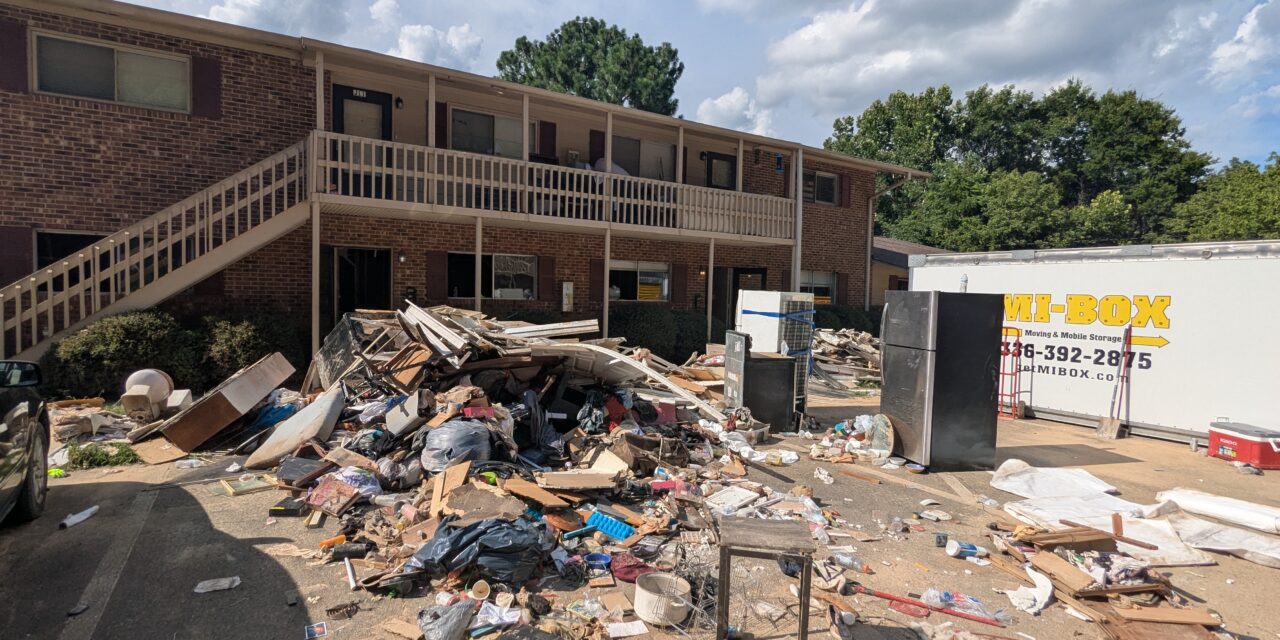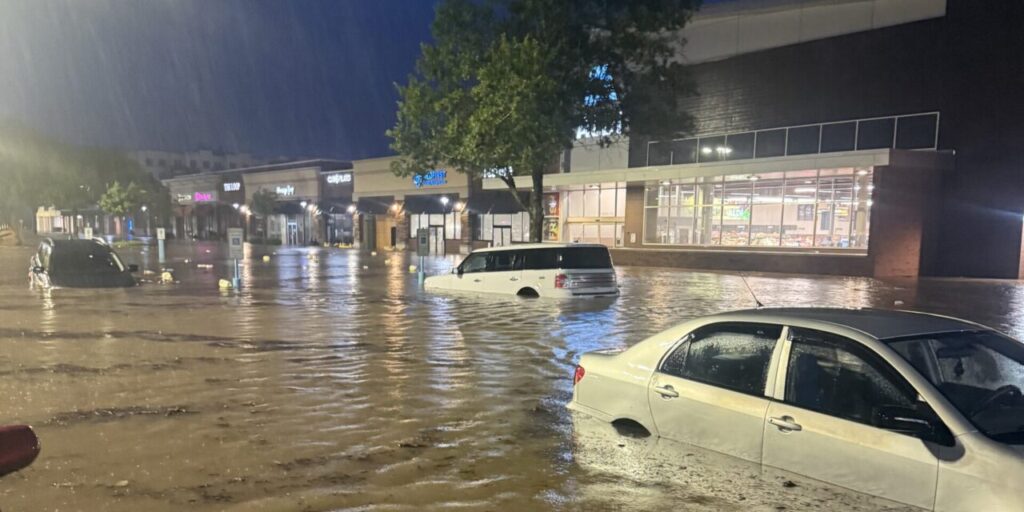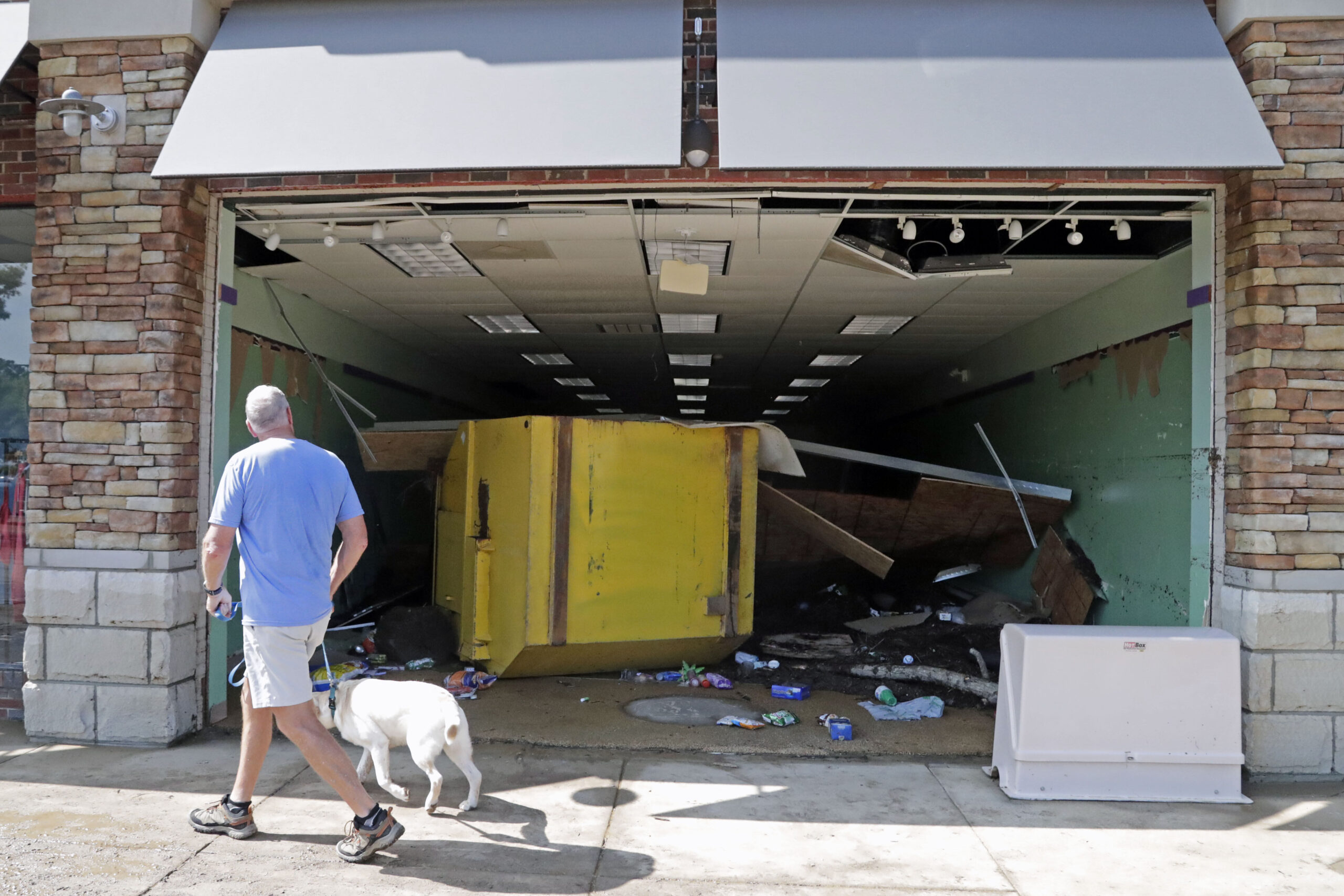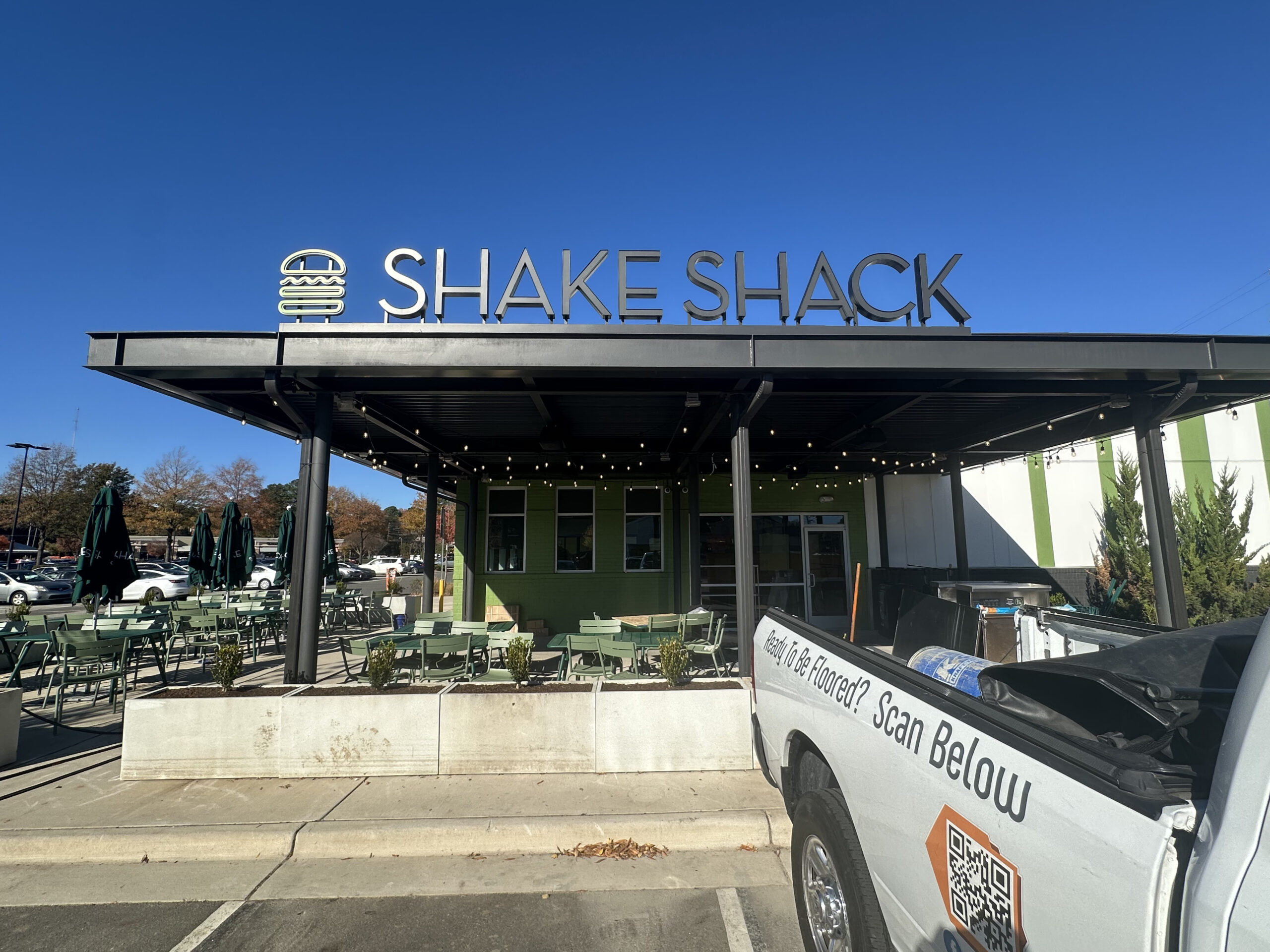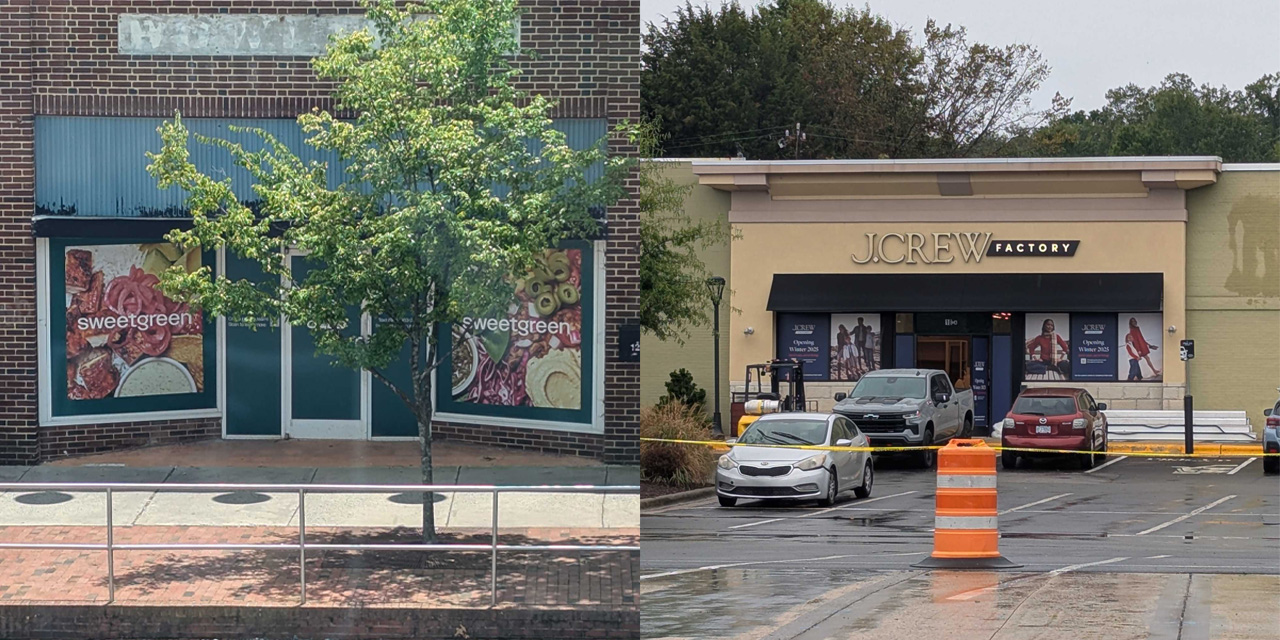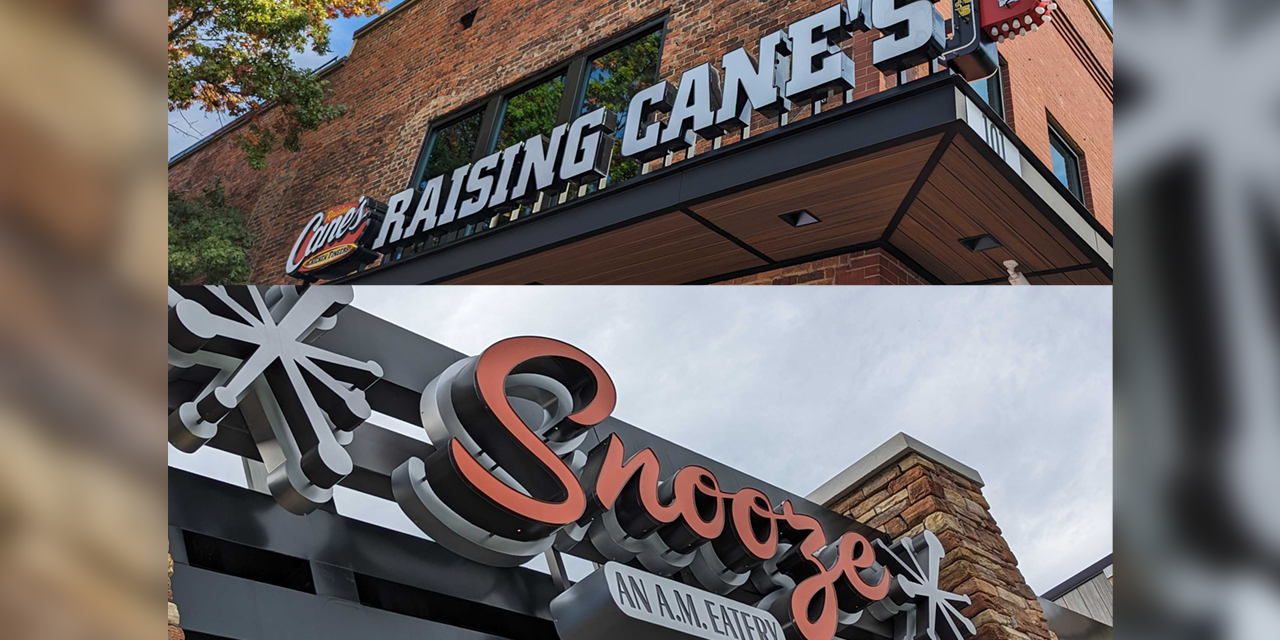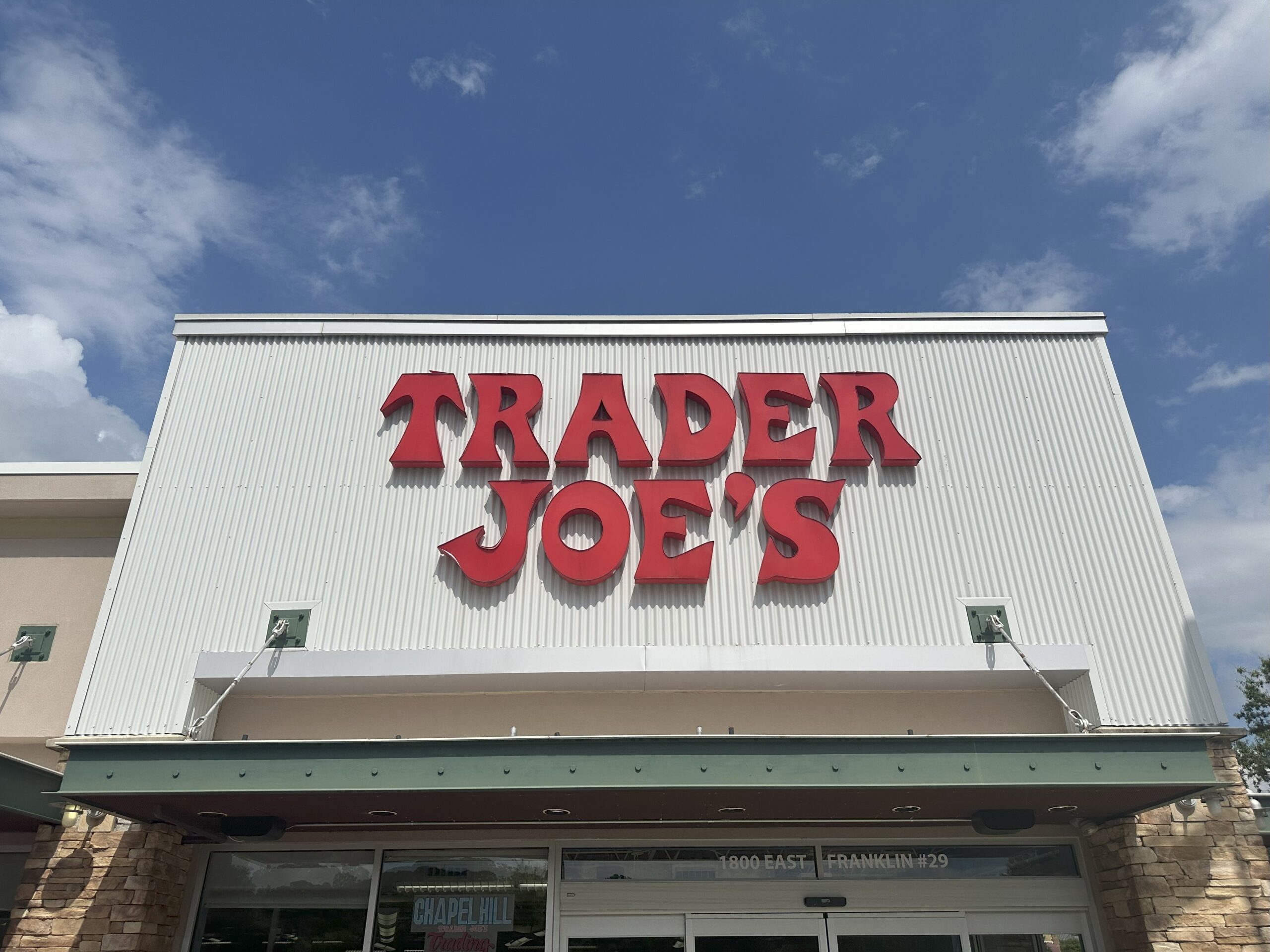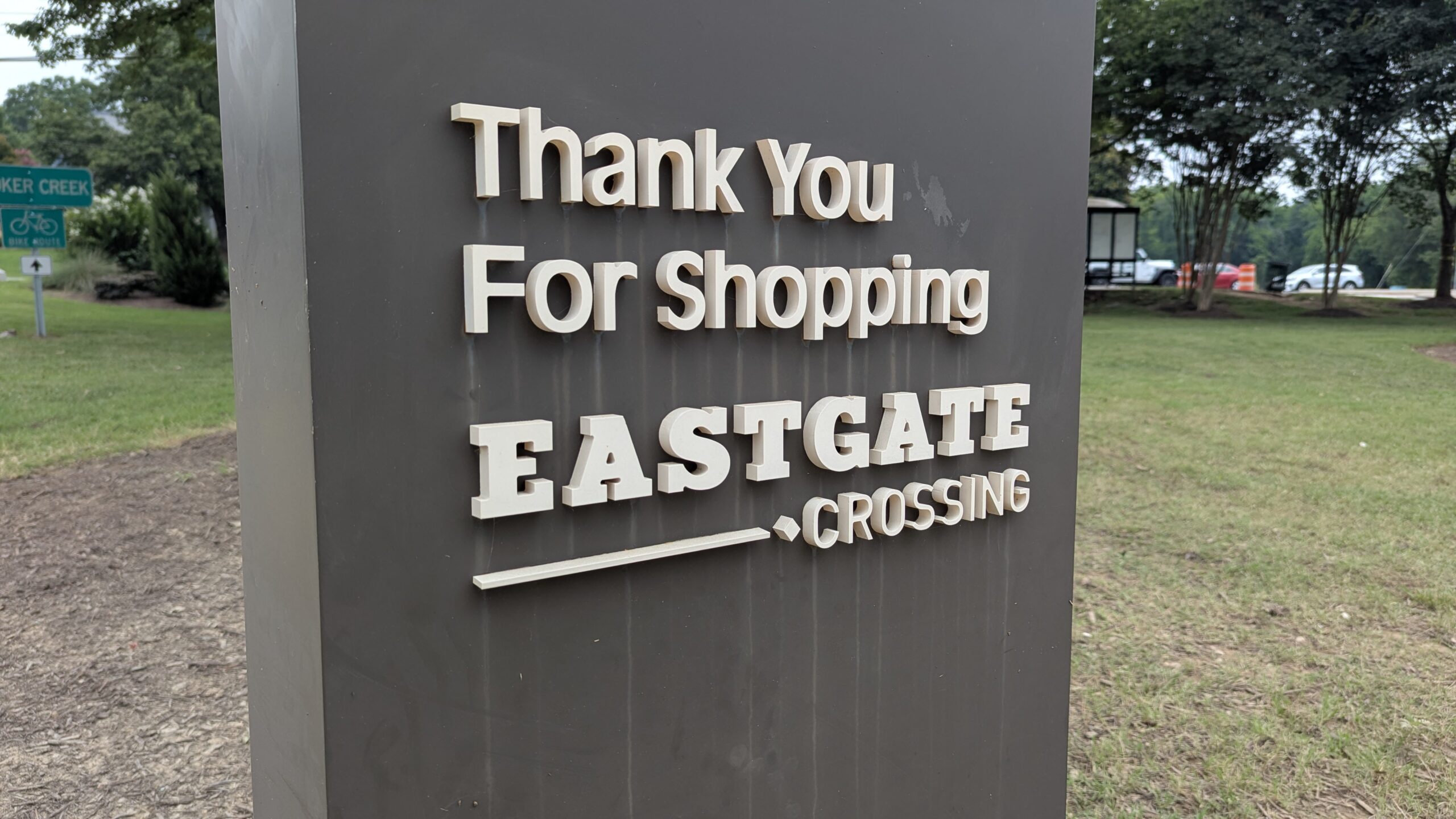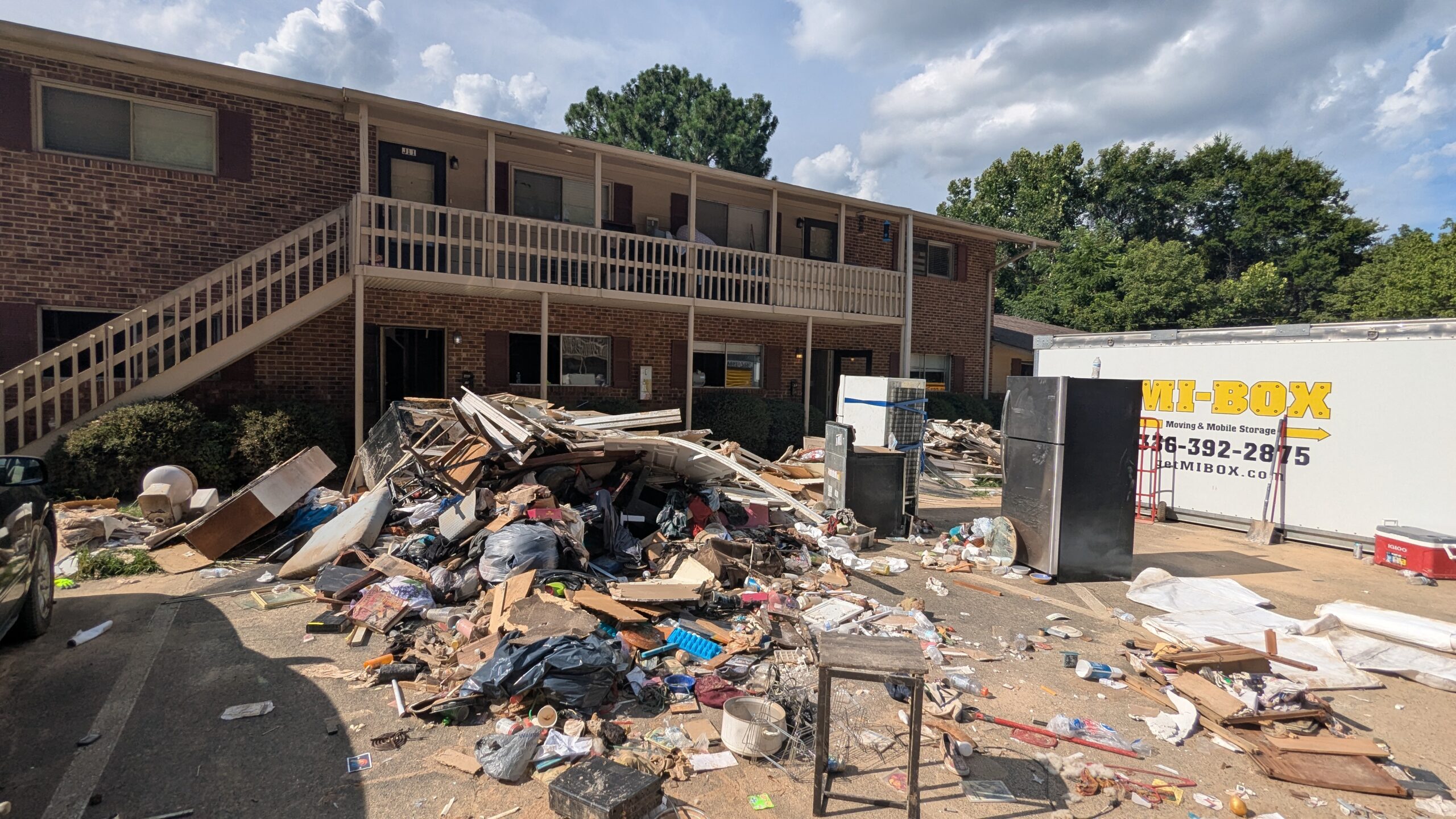It has now been more than two weeks since Tropical Depression Chantal dropped a record amount of rain on the western Triangle, leaving six dead, hundreds displaced, numerous businesses devastated, and tens of millions of dollars in overall damage.
In the last two weeks, we’ve seen countless small acts of heroism from residents who have gone above and beyond to help their neighbors – even, in some cases, while dealing with damage to their own homes. But the need remains great and the invisible human cost remains incalculable – particularly for businesses in the Eastgate Crossing shopping center and residents in the Camelot Village condominium community, both of which were built in floodplains. Town officials say there’s no amount of stormwater mitigation that can prevent those areas from flooding in the future, but that leaves Camelot residents and Eastgate businesses in a difficult position: staying in their current spot would mean similar disasters are likely in the future, but moving to a new location would be even costlier.
In that context, 97.9 The Hill’s Aaron Keck welcomed three local leaders for an extended discussion on Chantal and its aftermath: Chapel Hill Mayor Jess Anderson, Chamber for a Greater Chapel Hill-Carrboro CEO Aaron Nelson, and EmPOWERment Inc. executive director Delores Bailey.
Below is a transcript of some of their comments. Listen to the full discussion here:
On the impact of Chantal
Jess Anderson: It has been devastating. It’s hard to see what people have gone through: people being taken out of their homes on dinghies, people clearing out their homes and businesses. It has been incredibly heartbreaking. To walk in some of those spaces is pretty overwhelming, the smell and the debris and the chaos and people picking up their lives – you know, they’ve invested their whole lives in their businesses and their homes, and watching people carry that out piece by piece is not a happy thing to see…
We’ve allocated money to put folks in hotels. But it’s really traumatizing for people to be out of their homes, to be going through water rescues, to be in natural disasters and then to not have anything left. And then they’re not in their homes, which is where you go for safety. So I think the trauma that people are going through, even though they are safe now – I think it’s just really important for our community to remember that there are people who are just not okay right now.
Delores Bailey: I talked with (a) son whose mom and dad were stuck in their home. And he said, ‘Delores, we’ve been flooded three times, but this is the worst I’ve ever seen.’ This wasn’t an easy flow, this was a river. They couldn’t get out if they wanted to. And of course they’ve lost everything – and that’s where they’ve lived for 30, 40 years. (Will you) ever be able to come back to that place or not? And of course, there are children saying, ‘Mom and Dad, get out of there.’ And they’re going, ‘But that’s all we know.’ And then it’s $150,000 to get back in their home again, which is not possible. It’s just not.
Aaron Nelson: I think it’s a little bit like a car accident: right afterwards, everybody’s like, ‘oh, I think I’m okay.’ And then four days later they hurt like hell.
Click here to view a photo gallery of Chantal’s local impact.
On the future of Camelot Village
Jess Anderson: My absolute vision for that property is (to) find other alternatives for people over time, and we get that place offline… The town has tried (to use FEMA funds to buy out the property) in 2005, 2009, 2013, 2019, (but we) cannot legally force private property owners to do things they don’t want to do.
Delores Bailey: What I’m hearing and feeling is (that) people don’t want to sell. They realize they’re getting flooded every two or three years, but that’s home to them.
Jess Anderson: I have also been hearing from a lot of folks who are stuck. They want to go, (but) they are not able to get out right now. They can’t sell it for anything reasonable that can get them somewhere else. And because they have holdout neighbors (who don’t want to be bought out), they are stuck. And we’re talking about not just owners, but renters. There are (landlords) who are renting out (units) in Camelot from out of state. (We) do have owners who would very much like to be bought out, but that is not an option unless the entire building agrees. And so this has been an incredibly gnarly, complex situation that the town is going to continue to work on…
Nobody’s given up. We’re going to take this tragedy to try and create good out of it. But this is not something that we’ve had success with (in the past), because it’s a private property situation. There are people who don’t want to go, (and) there are people who do not want to go back. And it is heartbreaking for both…
The other issue that we keep hearing over and over again is that people are not really understanding what they’re signing up for. …I think at the end of the day, it’s one thing to say ‘this place floods,’ it’s another thing for people to experience what they experienced on (July 6). I don’t think your mind can really take in what you’re signing up for, especially when you have very limited resources. And this is a place with an amazing location, in terms of proximity to other things. You take a chance. You take a chance.
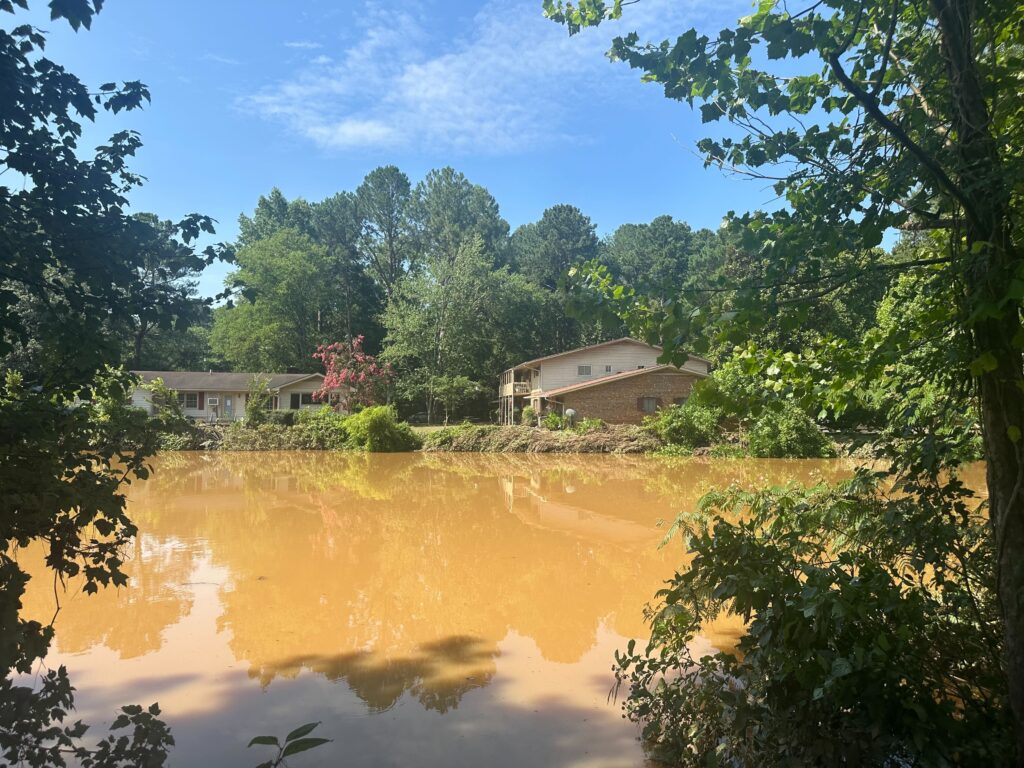
The lake at the center of Camelot Village, still brown after Sunday’s flooding. (Henry Taylor / Chapel Hill Media Group)
On the future of Eastgate Crossing
Aaron Nelson: Eastgate prides itself on (having) a bunch of locally owned and operated businesses, (and) it’s a complete and total loss. They’re in a floodplain, so they should have had flood insurance – but the largest flood policy, of anybody we’ve spoken to, was $100,000. That’s not enough. And then there’s a big conversation about who owns what, what is the tenant’s (and) property owner’s obligation? … What we’re hearing most (from Eastgate businesses) right now is: ‘help me read this lease and understand what’s mine and what’s theirs’ …
Chipotle is (already) up and running, and I wouldn’t be surprised if Trader Joe’s (is) up and running next week. But there will be others, particularly locally-owned and operated (businesses), for which that will be more difficult. There will need to be a unique model. There have to be other models on how we fund this crisis. Community Home Trust, for example: they make you put a little bit away (into a fund) for future problems. It may be that developments that know that this is going to happen will have to put away (a fund) to prepare for a response. The North Carolina Chamber of Commerce is convening a conversation to talk about these in Asheville and other places. Had Eastgate, for the last 20 years, put money in a (fund), what would there be?
Jess Anderson: (Eastgate business owners) need a lot of help, but there’s also reticence: this can happen again tomorrow, you know? We (need to) think about a longer-term solution (for) places that we really can’t mitigate to the level we need…
I don’t think that any of these places should be rebuilt the way they looked last week. It’s not safe for the people who live and work there, and it’s not safe for the customers and folks coming in. I think we need to figure out ways where we can help those folks hang on and get back to their livelihoods and their homes. And we need to have conversations about how we adjust and how we do this differently, knowing that we are no longer in 1970, we are in 2025, and the world looks different and weather looks different.
On whether recent development exacerbated the flood problems
Jess Anderson: One of the things that I would caution folks is (not) to decide that the newer homes, other people’s homes, somehow created this crisis or did something to hurt others. … A lot of these (damaged) places were built in floodplains before we had regulations that don’t allow people to build in floodplains. There is no development happening around these areas that has exacerbated anything. We have stronger stormwater regulations than the state requires. You’re not allowed to have additional impervious surface that’s letting off more storm water when you’re done developing these places. But when you’re talking about a 500- to 1000-year storm: it doesn’t matter if it was a vacant lot, if it was a field, if it was filled with trees or if it has an apartment building in it or retail – there was nothing that was going to prevent those places from flooding.
Aaron Nelson: Every time a redevelopment has happened, the stormwater (situation) has gotten better. The new culverts in front of Squid’s radically improved however high (the water) would’ve been had that not been fixed. In previous floods, the Graduate Hotel (downtown) flooded. Water came through the front doors. And this time, it did not, (because) the systems had been improved. Glen Lennox is the same: Glen Lennox would have flooded (in the past) and this time it did not. South Green (in Carrboro) would have been a pond, and now – a little water came into Kumon, and they were open the next day.
On Chapel Hill’s sidewalks, trails, and infrastructure, which sustained an estimated $6 million in damage
Jess Anderson: This is beyond (just) sending out some crews to fix. This is going to take a long time. There are places where the sidewalk is dipping down three feet. Folks are going to have to hang in there. When you get out there in town and you see that things don’t look like they’ve been attended to – it’s not that they are not going to be fixed, but it’s not going to be as fast as we want. We appreciate all the patience: it is going to be longer than I want, than any of us want for this stuff to be back to working. So please just pay attention to the danger signs, and don’t think that you can just go past them. It really is not safe in these places because there’s been many millions of dollars of sustained damage. And we have to figure out where that money is going to come from. We’re going to have to go through council to allocate funds to a lot of this repair and then bid it out.
On what we can do to help each other in the aftermath of Chantal
Aaron Nelson: We learned in COVID: (there are) these ants, these ants that when the water rises, they form a ball and they float around, on this little raft that they all create to hold onto each other. And then when the water recedes, they all go back about their business. It’s their savior strategy. And it’s a fact. It’s a fabulous natural solution – because when they get flooded out of their hill, they hold onto each other and float. If they would let each other go, they’d all drown. And so you got to reach out to the resources, if you’re feeling like, ‘ah, there’s just so much.’ You just got to reach out to somebody.
Delores Bailey: These families are going to have to learn how to live differently. The money’s not there, the insurance wasn’t there. They’ve got to figure out where they’re living, how they’re living. If they’re not in public housing, then there’s not guaranteed hotels for them. (So) look out for those people. Call folks. Call people that you’ve worked with. Call your friends and your family. Because there are a lot of people who are hurting. And (they) don’t know where and how to get to help. …We together as a community can help. We’ll be the ants holding on together.
Jess Anderson: I have to reiterate how amazing the helpers have been. The entire staff has been working day and night – literally, people didn’t sleep for days – working on how to keep people safe and how to get them back into their homes and businesses. There were all the first responders who were risking their own lives to get folks out. A lot of those folks were dealing with their own emergencies, and they were out in water up to their chest, pulling people out of units…
There’s a lot of folks who are really not okay right now in this community, so – please thank our staff, thank all the volunteers, and please be kind to everybody out there. There are folks who have lost a lot, who you may run into in the grocery store, and they may not be at their best, so please have some grace and please take care of each other. And we’re all going to get through it.
Featured photo by Brighton McConnell: damage at Camelot Village after Tropical Depression Chantal.
Chapelboro.com does not charge subscription fees, and you can directly support our efforts in local journalism here. Want more of what you see on Chapelboro? Let us bring free local news and community information to you by signing up for our newsletter.

